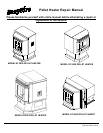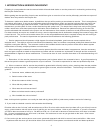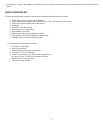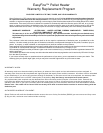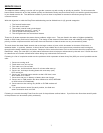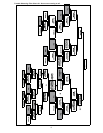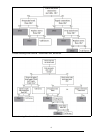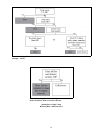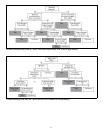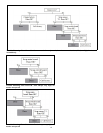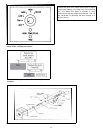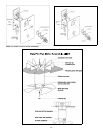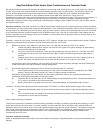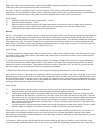3
1. INTRODUCTION & SERVICE PHILOSOPHY
Following is a comprehensive service manual which will assist both dealer or service personnel in maintaining and servicing
the Easyfire Pellet Stoves.
Before getting into the specifics of service we would like to give an overview of our service philosophy and what we expect of
dealers when they take on the Easyfire line.
To become a pellet stove dealer means, by definition, that you will be making a commitment to service. This is an appliance,
not another wood stove. If you are not prepared to enter into the appliance repair and service business then you should not
even consider becoming a pellet stove dealer. Pellet stoves for the most part are wonderful heaters that will, with proper
maintenance, provide years of clean, trouble free burning and quality heat. The simple fact is they have many moving parts,
unlike a wood stove, and these parts require lubrication and maintenance. Because the pellet technology is new the user
must be educated and trained as to the proper use and maintenance from season to season to avoid performance problems.
For these reasons we require our dealers to set up a service department that is dedicated to keeping the customer happy with
a care free unit. The user must be made aware of his or her responsibilities and what is required to keep the unit working at
peak performance. The service department and personnel should adhere to the following guidelines:
1. Service personnel should possess a high degree of mechanical aptitude, good common sense coupled with an
analytical mind. The ability to read and use electrical schematics, listen to customer complaints politely and determine what
might be causing the difficulty. The customer needs to feel confident that the service person will be able to detect system
malfunctions accurately, analyze problems and solve them.
2. When entering the customer's home the service person should be neat and clean in appearance, have the necessary
tools and parts required to attend to the problem and share with the customer an explanation of charges and the customer's
responsibilities in regards to future maintenance. This must be done in such a manner that there is no misunderstanding or ill
feeling.
3. Remember, it is the service person who represents your business when in the customer's home. A good impression by
the service person creates a good impression of your business. The work is expected to be neat and professionally done.
4. When a customer calls for service they should be greeted with a friendly calming voice, assuring them that the problem
will be given prompt attention. It is important to get and give accurate, relevant information. The following is an information
guideline:
a. Customer name, address and phone number.
b. Serial number of the stove.
c. What the customer thinks is wrong.
d. When did the problem start.
e. When was the unit last serviced?
f. When and where was the stove purchased?
g. Who installed the unit and when?
Note: At this point the problem can usually be dealt with by phone (90% of pellet stove problems are lack of cleaning).
5. If you need to schedule a service call remember the following:
Prioritize calls so that "no heat" calls are taken care of first. Do minor calls next but don't put them off or you will only have an
angry, upset customer who will cause a lot of grief for you and your business. Stick to your schedule. If you tell a customer
you will be there tomorrow at 2:00 p.m. Be there at 2:00 p.m. or call well in advance to let them know, their time is valuable
too. If a part is needed and you don't have it, tell them, and order one as soon as you get back to the store. Give honest
responses, not creative excuses.
6. Once on the job the service person must use a systematic approach and think in terms of cause and effect. After some
experience with the stove you should be able to look at the fire, flame pattern, sounds and smells and detect problems



